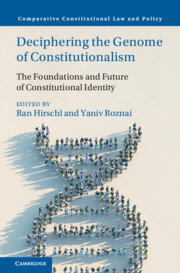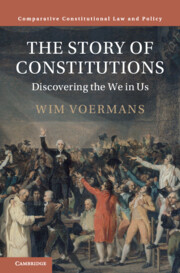194 results
21 - Illiberal Constitutionalism and the Abuse of Constitutional Identity
- from Part IV - Emerging Trends
-
-
- Book:
- Deciphering the Genome of Constitutionalism
- Published online:
- 14 March 2024
- Print publication:
- 21 March 2024, pp 272-285
-
- Chapter
- Export citation
7 - The Crisis in, and of, Constitutional Identity
- from Part I - Foundations, Theory, and Concepts
-
-
- Book:
- Deciphering the Genome of Constitutionalism
- Published online:
- 14 March 2024
- Print publication:
- 21 March 2024, pp 89-98
-
- Chapter
- Export citation

Deciphering the Genome of Constitutionalism
- The Foundations and Future of Constitutional Identity
-
- Published online:
- 14 March 2024
- Print publication:
- 21 March 2024
Constitutional Symbolism in the Shadow of the Common Good
-
- Journal:
- German Law Journal ,
- Published online by Cambridge University Press:
- 05 March 2024, pp. 1-18
-
- Article
-
- You have access
- Open access
- HTML
- Export citation
Conclusion
-
- Book:
- Who Is a True Christian?
- Published online:
- 04 January 2024
- Print publication:
- 22 February 2024, pp 271-292
-
- Chapter
- Export citation
Gouvernance et démocratie fédérale en temps de crise : quelques leçons tirées de la pandémie de COVID-19 au Canada
-
- Journal:
- Canadian Journal of Law & Society / La Revue Canadienne Droit et Société / Volume 38 / Issue 3 / December 2023
- Published online by Cambridge University Press:
- 21 February 2024, pp. 372-390
-
- Article
-
- You have access
- Open access
- HTML
- Export citation
Reflections on Constitutionalism and Democratic Governance in Africa
-
- Journal:
- Journal of African Law / Volume 68 / Issue 2 / June 2024
- Published online by Cambridge University Press:
- 12 February 2024, pp. 137-156
- Print publication:
- June 2024
-
- Article
- Export citation
17 - South Asia
- from Part II - Legal Families and Geographical Comparisons
-
-
- Book:
- The Cambridge Handbook of Comparative Law
- Published online:
- 26 January 2024
- Print publication:
- 01 February 2024, pp 343-366
-
- Chapter
- Export citation
15 - Latin America
- from Part II - Legal Families and Geographical Comparisons
-
-
- Book:
- The Cambridge Handbook of Comparative Law
- Published online:
- 26 January 2024
- Print publication:
- 01 February 2024, pp 302-330
-
- Chapter
- Export citation
18 - Sub-Saharan Africa
- from Part II - Legal Families and Geographical Comparisons
-
-
- Book:
- The Cambridge Handbook of Comparative Law
- Published online:
- 26 January 2024
- Print publication:
- 01 February 2024, pp 367-384
-
- Chapter
- Export citation
22 - Waves of Sedition across the Atlantic: Liberal Politics in Angola in the Wake of Brazilian Independence (c. 1817–1825)
- from Part II - Brazil, Portugal, and Africa
-
-
- Book:
- The Cambridge History of the Age of Atlantic Revolutions
- Published online:
- 20 October 2023
- Print publication:
- 09 November 2023, pp 567-588
-
- Chapter
- Export citation
20 - Slaves, Indians, and the “Classes of Color”: Popular Participation in Brazilian Independence
- from Part II - Brazil, Portugal, and Africa
-
-
- Book:
- The Cambridge History of the Age of Atlantic Revolutions
- Published online:
- 20 October 2023
- Print publication:
- 09 November 2023, pp 520-546
-
- Chapter
- Export citation
3 - Enlightenment and the Ibero-American Revolutions
- from Part I - Enlightenment and Culture
-
-
- Book:
- The Cambridge History of the Age of Atlantic Revolutions
- Published online:
- 20 October 2023
- Print publication:
- 09 November 2023, pp 106-131
-
- Chapter
- Export citation
18 - What Is a Constitution?
- from Part III - Concepts, Shapes and Types of Constitutions
-
- Book:
- The Story of Constitutions
- Published online:
- 19 October 2023
- Print publication:
- 02 November 2023, pp 203-220
-
- Chapter
- Export citation
17 - What Are the Lessons of History?
- from Part II - The History of the Constitution
-
- Book:
- The Story of Constitutions
- Published online:
- 19 October 2023
- Print publication:
- 02 November 2023, pp 193-200
-
- Chapter
- Export citation

The Story of Constitutions
- Discovering the We in Us
-
- Published online:
- 19 October 2023
- Print publication:
- 02 November 2023
4 - Reformist Collaboration and the Formation of an Imperial Civil Society
-
- Book:
- Ethical Empire?
- Published online:
- 05 October 2023
- Print publication:
- 19 October 2023, pp 123-154
-
- Chapter
- Export citation
Introduction to special issue: Feminist manifestos and global constitutionalism
-
- Journal:
- Global Constitutionalism / Volume 12 / Issue 3 / November 2023
- Published online by Cambridge University Press:
- 25 August 2023, pp. 403-411
-
- Article
-
- You have access
- Open access
- HTML
- Export citation
Paradox Postponed
-
- Journal:
- Transactions of the Royal Historical Society / Volume 1 / December 2023
- Published online by Cambridge University Press:
- 18 August 2023, pp. 369-372
- Print publication:
- December 2023
-
- Article
- Export citation
18 - Conservatism
- from Part III - Politics
-
-
- Book:
- The Cambridge Constitutional History of the United Kingdom
- Published online:
- 12 August 2023
- Print publication:
- 17 August 2023, pp 457-479
-
- Chapter
- Export citation



